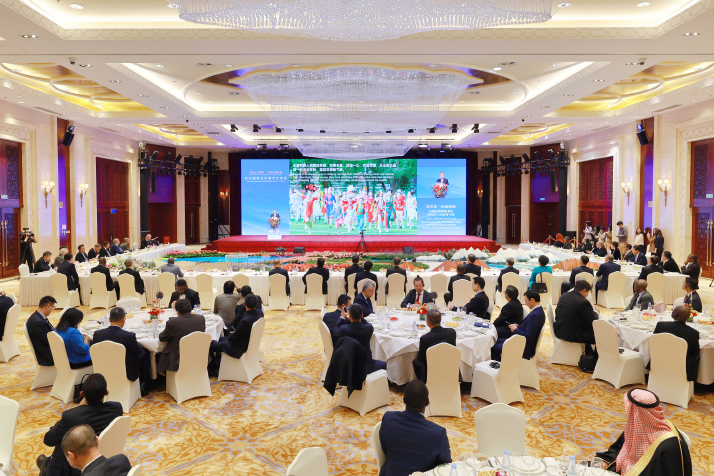| Xinjiang Today |
| Rediscovering Xinjiang | |
|
|
 The government of Xinjiang Uygur Autonomous Region hosts an exchange session for foreign diplomats and representatives of international organizations in Beijing on March 31 (CUI ZHIJIAN)
On March 31, the government of Xinjiang Uygur Autonomous Region hosted an exchange session in Beijing for diplomats from 43 countries and representatives of international organizations. Seventy international participants from across the globe gathered to hear Xinjiang's stories, foster deeper ties and explore fresh opportunities for collaboration. This event, the second of its kind, aimed at sharing Xinjiang's latest achievements in reform, development and stability; highlighting the region's growing openness, inclusiveness and confidence; and further strengthening traditional friendships. It also sought to deepen mutual understanding and trust, as well as elevating friendly exchange and practical cooperation between China's Xinjiang and countries around the world to a new level. Edited excerpts from remarks by some of the participants at the event follow: Erkin Tuniyaz, Deputy Secretary of the Communist Party of China (CPC) Committee of Xinjiang Uygur Autonomous Region and Chairman of the People's Government of Xinjiang: Since the 18th National Congress of the CPC, held in 2012, Xinjiang has been the focus of a series of strategic initiatives aimed at fostering regional stability, economic growth and ethnic unity. President Xi Jinping's visits in July 2022 and August 2023 reaffirmed the national leadership's commitment to positioning Xinjiang as a key player in China's overall development strategy. The region has made notable strides in both its economic and social development. In 2024, Xinjiang's GDP exceeded 2 trillion yuan (about $278.6 billion), registering a 6.1-percent year-on-year increase. Foreign trade surged by 21.8 percent. The agricultural sector continued to thrive, boasting China's highest grain yield per unit of land area and accounting for over 92 percent of China's total cotton output. Meanwhile, Xinjiang's installed renewable energy capacity has surpassed 100 million kilowatts, signaling a green transition in its energy portfolio. Investment in social development remains a top priority, with more than 77 percent of fiscal spending directed toward improving public wellbeing. This has resulted in expanded employment, better educational outcomes and enhanced healthcare services. Life expectancy has risen to 76 years, and strengthened social security systems now provide more comprehensive protection coverage. Major ecological restoration efforts have also yielded significant environmental gains. Culturally, Xinjiang continues to promote unity and inclusivity through initiatives that reinforce a shared national identity, support the passing on of ethnic languages and traditions, and foster interethnic exchange. Freedom of religious belief is respected, with normal religious activities proceeding freely without interference. Despite these achievements, Xinjiang continues to face unwarranted international criticism, often rooted in politically motivated misinformation. These distortions fail to reflect the reality on the ground. The region's sustained progress and rising living standards stand as strong testimony to its commitment to human rights, development and social harmony.  Students from Shanghai Cooperation Organization member countries visit a museum showcasing the Xinjiang Salamander, a species dating back 350 million years, at the Xinjiang Normal University in Urumqi in April 2024 (XINHUA)
Nurlan Yermekbayev, Secretary General of the Shanghai Cooperation Organization (SCO): As the gateway for China's westward opening up and a core area of the Silk Road Economic Belt, Xinjiang holds immense potential for regional cooperation. It shares borders with eight of the 10 member countries of the SCO, making it a natural hub for connectivity and collaboration. In recent years, Xinjiang has capitalized on its strategic location, rich resources and cultural diversity to deepen ties with SCO member states. With support from both the central and regional governments, it has become a key hub and a demonstration platform for cooperation within the SCO, particularly in areas such as security, counterterrorism and regional stability. The region's expanding role is evident in major development projects like the Urumqi International Land Port and Kashi (Kashgar) and Huoerguosi (Khorgas) economic development zones, alongside growing achievements in trade, finance, logistics, healthcare and cross-border infrastructure. Looking ahead, Xinjiang is well-positioned to further develop economic zones, cooperation centers, logistics hubs and industrial parks under the framework of the SCO. SCO member states value its contributions and recognize its enthusiasm for deeper engagement. With China assuming the rotating SCO presidency for 2024-25, Xinjiang is set to play an even greater role, both in hosting events and advancing cooperative initiatives. I've visited Xinjiang many times, and I continue to be impressed by its remarkable transformation—an achievement shaped by wise national policies. Chen Xiaodong, Chinese Vice Minister of Foreign Affairs: This event provides an excellent platform for enhancing mutual understanding and expanding Xinjiang's international cooperation. Xinjiang has historically served as China's gateway to the West and an important hub along the Silk Road, characterized by diverse cultures and harmonious coexistence among various ethnic groups. Under President Xi's strategic vision, Xinjiang has made significant progress in maintaining long-term stability, promoting high-quality economic growth and advancing regional openness through the Belt and Road Initiative. Xinjiang is experiencing its most stable and prosperous era to date, characterized by remarkable economic achievements, technological advancements and harmonious multicultural development. The region actively integrates itself into China's overall development strategy, expanding international connectivity and fostering cross-border economic cooperation. Despite misleading narratives promoted by a few external voices, the truth remains clear: Xinjiang's impressive social and economic progress speaks for itself. I call on all friends to support Xinjiang's development, contribute to its openness, and share its true, vibrant culture with the global community. Farhod Arziev, Ambassador of Uzbekistan to China: Uzbekistan and China share centuries of close friendship, which continues to strengthen rapidly across various sectors. The warm and trusting relationship between leaders of the two countries has provided a solid foundation for expanding our partnership to an all-weather comprehensive strategic level. Uzbekistan and China have achieved significant growth in trade and economic cooperation. Currently, our bilateral trade is approximately $14 billion, with ambitious targets to reach $20 billion in the near future. Over the past five years, Chinese investments totaling around $20 billion have been implemented in Uzbekistan, with more than 3,500 Chinese companies actively participating in projects in diverse fields such as petroleum, railways, agriculture and mechanical engineering. Xinjiang, situated strategically as China's gateway to Central Asia, plays an essential role in our expanding partnership. Last year alone, trade between Uzbekistan's regions and Xinjiang exceeded $1.25 billion, notably in agriculture, textiles and technology sectors. Moreover, significant infrastructure projects, like the historic China-Kyrgyzstan-Uzbekistan Railway, underscore the importance of our shared vision for connectivity and development. Khalil Hashmi, Ambassador of Pakistan to China: Reflecting on my visits to Xinjiang over the past 16 years, I have witnessed remarkable transformations. Today, Xinjiang stands as a testament to rapid development, characterized by enhanced infrastructure, vibrant cities, flourishing green energy projects and a growing digital economy. I praised Xinjiang's dynamic progress, attributing it to visionary leadership and the strategic goal of building a community with a shared future for humanity. The recent historic agreement designating the Hongqilapu (Khunjerab) Pass, which is in the Tashikuergan (Taxkorgan) Tajik Autonomous County, as an all-weather border crossing, symbolizes our shared commitment to enhancing year-round trade and connectivity. This significant development strengthens economic ties and reinforces the profound friendship between Pakistan and China. As we look to the future, I am optimistic about strengthening our bilateral cooperation in trade, tourism and cultural exchange. There are great opportunities available for Pakistan's natural produce, textiles and technological services in Xinjiang's markets, and Xinjiang's rich cultural heritage and diverse landscapes are attractions for the people of Pakistan. I look forward to working more closely with Chinese counterparts to further strengthen our comprehensive partnership. The mountains that connect us are high, but the friendship that binds us is higher still. Our cooperation also extends robustly into education, science and tourism. We actively engage with Chinese institutions such as the Xinjiang Institute of Ecology and Geography, fostering academic exchanges, joint research and cultural tourism along the historic Silk Road. Deepening practical cooperation between Uzbekistan and Xinjiang will open extensive opportunities for businesses, promote cultural exchange and lead to shared prosperity for our peoples. Alberto Blanco Silva, Cuban Ambassador to China: Years ago, I had the opportunity to visit Xinjiang. Its expansive grasslands, majestic snow-capped mountains and villages rich with ethnic charm have left an indelible impression on me. Today, I often hear of Xinjiang's remarkable strides in economic growth, technological innovation and the preservation of its vibrant cultural heritage, highlighting its impressive achievements in modernization. I eagerly look forward to returning to witness firsthand the bustling trade at the Urumqi International Land Port Area, a testament to the region's dynamic role in advancing Belt and Road cooperation, and to explore the beautifully renovated Ancient City of Kashi, soaking in timeless historic allure. Revisiting these familiar places will undoubtedly offer fresh surprises and renewed appreciation for Xinjiang's captivating transformation. Comments to ffli@cicgamericas.com |
|
||||||||||||||||||||||||||||
|